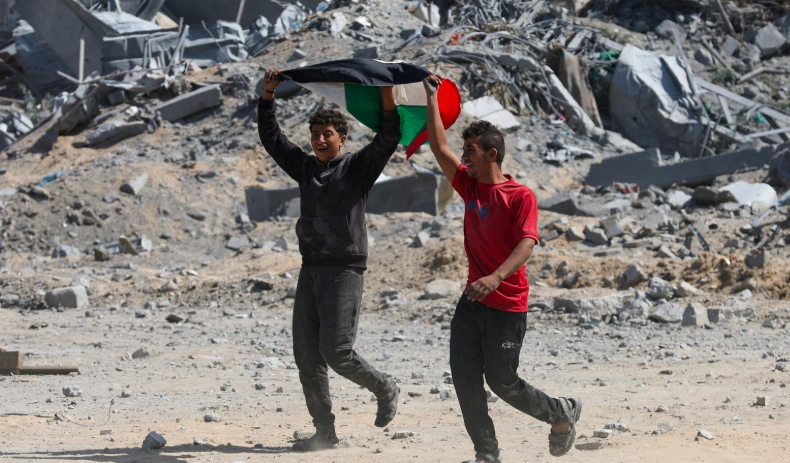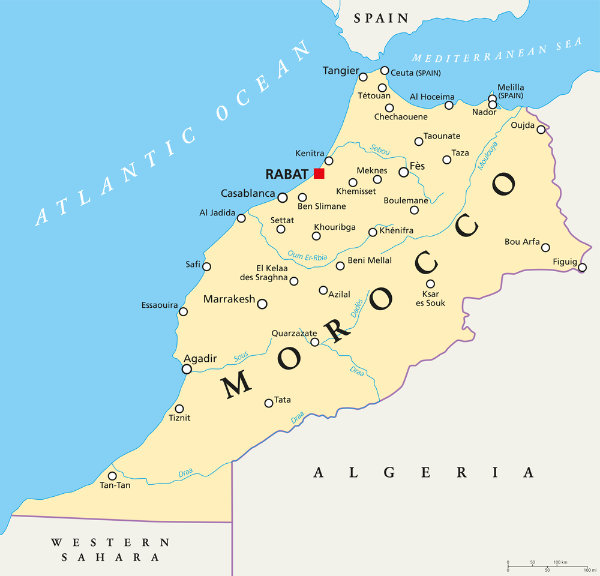The Russian Foreign Minister, Sergey Lavrov, has held discussions in Moscow with Nasser Bourita, the Minister of Foreign Affairs of the Kingdom of Morocco. They had also met last month in New York.
Lavrov had this to say: “We reiterated mutual firm commitment to continuing joint work aimed at further strengthening the traditionally friendly and trust-based strategic partnership between our two countries and reviewed in detail bilateral issues and briefly touched on trade and economic exchanges. Both sides are interested in expanding trade and identifying areas for mutual investment.
We agreed that the potential for practical cooperation in these areas is far from being exhausted. October 17 will be the 8th Meeting of the Russian-Moroccan Intergovernmental Joint Commission on Economic and Scientific-Technical Cooperation, with my colleague Dmitry Patrushev co-chairing it from the Russian side. The agenda of the Intergovernmental Commission is rich and diverse, and we are looking forward to seeing good results.
We were pleased to note the high level of interaction in a number of other areas, particularly in the humanitarian sphere, notably, education. Currently, 4,250 Moroccan students are studying in Russia. There is strong interest in obtaining education in our country, and we will continue to support it as best we can. We will do our best to accommodate everyone wishing to study at Russian universities.
We discussed promising contacts between our media outlets as well. There are reciprocal journalist visits and internship exchanges, which we will continue to encourage as well.
Our foreign ministries maintain steady and trusting contacts, primarily at the United Nations, as well as in other international venues, including the Russia–Africa and Russia-Arab League forums.
We share the view that our interaction and coordination will be further enhanced by the Memorandum of Understanding on the establishment of an Inter-Ministerial Working Committee to deepen the strategic partnership between the Russian Federation and the Kingdom of Morocco, which was just signed.
We exchanged views on urgent international challenges, prioritizing the situation in the Middle East, North Africa, and the Sahel-Sahara region. We also discussed the situation surrounding the Western Sahara settlement in light of ongoing discussions at the UN Security Council.
We reaffirmed our principled position in favor of resolving all remaining issues and conflicts in Africa and other parts of the world exclusively by political and diplomatic means, relying on the fundamental principles and norms of international law enshrined in the UN Charter. We share the view that these principles must not be applied selectively à la carte but be fully respected and implemented in their entirety and interconnection.
Gaza

We discussed in detail the situation in the Palestinian-Israeli conflict zone. Morocco traditionally plays an important part in promoting efforts towards peaceful settlement of the Palestinian issue. In this regard, we note the role played by His Majesty King Mohammed VI as Chairman of the Al-Quds Committee of the Organization of Islamic Cooperation.
We welcomed the emerging positive changes on the ground, meaning the Palestinian territories, primarily the Gaza Strip. We expressed satisfaction with the successful launch of the first phase of the agreements between Israel and Hamas on a ceasefire in Gaza and an exchange of detainees. This agreement was reached with the mediation of the United States, Egypt, Qatar, and Türkiye.
We expect that these agreements will be strictly observed, taking into account the results of the peace summit held on October 13 in Sharm el-Sheikh, and that their implementation will not mark the end of the process but will be followed by further steps. These were discussed extensively, including at the Sharm el-Sheikh summit.
The ceasefire in Gaza must be sustainable in order to enable the delivery of humanitarian aid and the subsequent large-scale rebuilding of the enclave’s infrastructure, which has been almost completely destroyed during the hostilities. Otherwise, our efforts to create conditions for the return of internally displaced persons and refugees will not succeed. These are serious matters. It is important to address them in a way that does not undermine the prospects for full implementation of UN resolutions on the establishment of a Palestinian state and to ensure that the humanitarian processes currently underway contribute to the creation of conditions for a political solution that eliminates the core causes of the Palestinian-Israeli and Arab-Israeli conflicts. It is essential to resume the Middle East peace process as soon as possible based on UN resolutions providing for the creation of an independent Palestinian state living in peace and security side by side with Israel.
Ukraine

We expressed our appreciation to our Moroccan colleagues for their balanced and well-considered position on the situation in and around Ukraine. In Rabat, as in most capitals of the Global South and the Global East, there is an understanding that a sustainable settlement is impossible without addressing the underlying causes of the crisis, namely, the security threats to Russia that NATO has created over many years by moving its military infrastructure ever closer to our borders and using Ukraine as a launching pad to create threats to our country.
This also includes gross violations, even legislative bans, of the rights of the Russian-speaking people in Ukraine, not only linguistic rights but also religious rights when, along with outlawing the Russian language, the canonical Ukrainian Orthodox Church was banned.
Cultural Cooperation

I would like to close by noting that next year marks the 10th anniversary of the adoption, at the top level, of the Joint Statement on Deepening the Strategic Partnership. We agreed to mark the occasion with a series of events, including exchanges of delegations between sector-specific ministries and the stepping up of parliamentary contacts. Our Moroccan friends have supported the idea of holding Russian Culture Days in Morocco.
We will continue to maintain an all-embracing and trust-based dialogue.”

With a population of approximately 38 million, Morocco’s GDP (PPP) is around US$396.52 billion, with a GDP per capita (PPP) of approximately US$10,620. The country is projected to have a 4.4% growth in GDP for 2025. This is partially due to ongoing infrastructure development for major events such as the 2025 Africa Cup of Nations, which kicks off in December, and the 2030 World Cup.
Bilateral trade between Morocco and Russia has been growing steadily, with trade turnover reaching about US$3 billion during 2024. This relationship continues to strengthen, with both countries exploring further economic cooperation. Russia has expressed its commitment to establishing a free trade zone with North African countries, including Morocco. However, there remain issues to clear up in terms of an erratic import tariff system in Morocco, although Russia’s bilateral trade is significant, as it constitutes a sizeable part of Russia’s overall commerce with the African continent.
Russian importers are traditionally interested in grapes, citrus fruits, nuts, and cocoa beans from Morocco and other North and East African countries. Morocco maintains close ties with particular regions of Russia. For instance, trade between the Russian Republic of Bashkortostan, a traditionally ethnic Turkic region, and Morocco increased 30-fold over the past five years. Various autonomous regions of Russia have been selectively astute in developing trade partners that fit mutual needs.
Overall, Russia’s exports to Morocco mainly consist of oil, diesel, coal, and inorganic chemicals. There are increasing exports of fertilizers, stone and plaster materials, aluminum, and cereals, among related products. Russia imports fruits and nuts and light industry products in addition to lumber, cars, veterinary vaccines, and IT services.
Russian grain suppliers are particularly interested in Morocco, as the country is among the top African importers of wheat, as it struggles with drought and desertification in its southern regions. Morocco imported a record US$280 million of Russian agricultural produce– mainly wheat – in 2024.
According to the results of the agricultural campaign, from July 1, 2024, to June 30, 2025, Morocco imported 1 million tons of Russian wheat, which is more than double the figure of the previous season. According to the National Federation of Grain and Legume Traders of Morocco, Russia took second place among suppliers of soft wheat, second only to France, which supplied 1.5 million tons. In addition to soft wheat, beet pulp, sunflower and rapeseed meal, and feed wheat were present in the export structure.
This year, the Russian government approved a new draft agreement with Morocco on cooperation in the field of marine fisheries. After reaching an agreement, Rosrybolovstvo was instructed to sign a document allowing Russian vessels to extract up to 80,000 tons of seafood, mainly sardines, sardinella, mackerel, and anchovies.
Russian tourism to Morocco is also increasing as Russian holidaymakers look for non-European destinations, with Morocco receiving the largest share of Russian tourists visiting Africa.
Other industry trade sectors are also increasing. Russia is exporting pharmaceuticals to Morocco, with some producers looking at investing in the country to gain access to other MENA markets. The expansion of compulsory health insurance in Morocco is significantly increasing the need for pharmaceuticals. These include insulins, vaccines, and anti-cancer drugs. Russian companies have already localized production of several medications is supplying sought-after drugs, and negotiations on technology transfer are underway.
There has also been development in the IT sector, with Russian IT companies investing in the country to contribute towards Morocco’s National Digital Development Strategy. This aims to turn the country into one of Africa’s technology hubs by 2030.
E-government services are being developed, 5G is being rolled out, data centers are being created, and IT education is expanding. Against this backdrop, Russian companies are finding a niche in cybersecurity, digital governance, agro-technologies, and intelligent transport systems.
The immediate Russia-Morocco trade outlook is highly positive.
Further Reading
Continue Reading





 Русский
Русский










